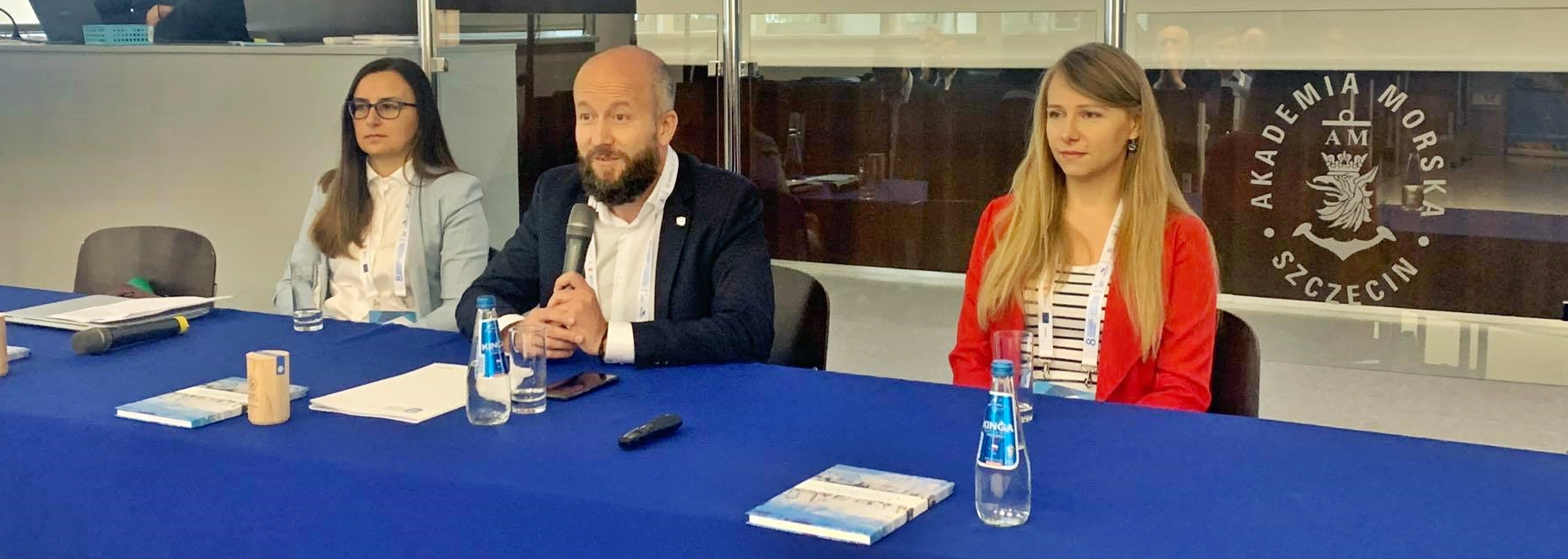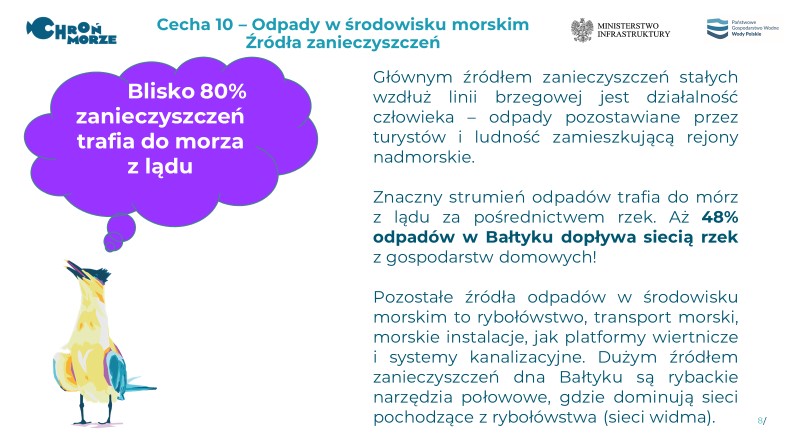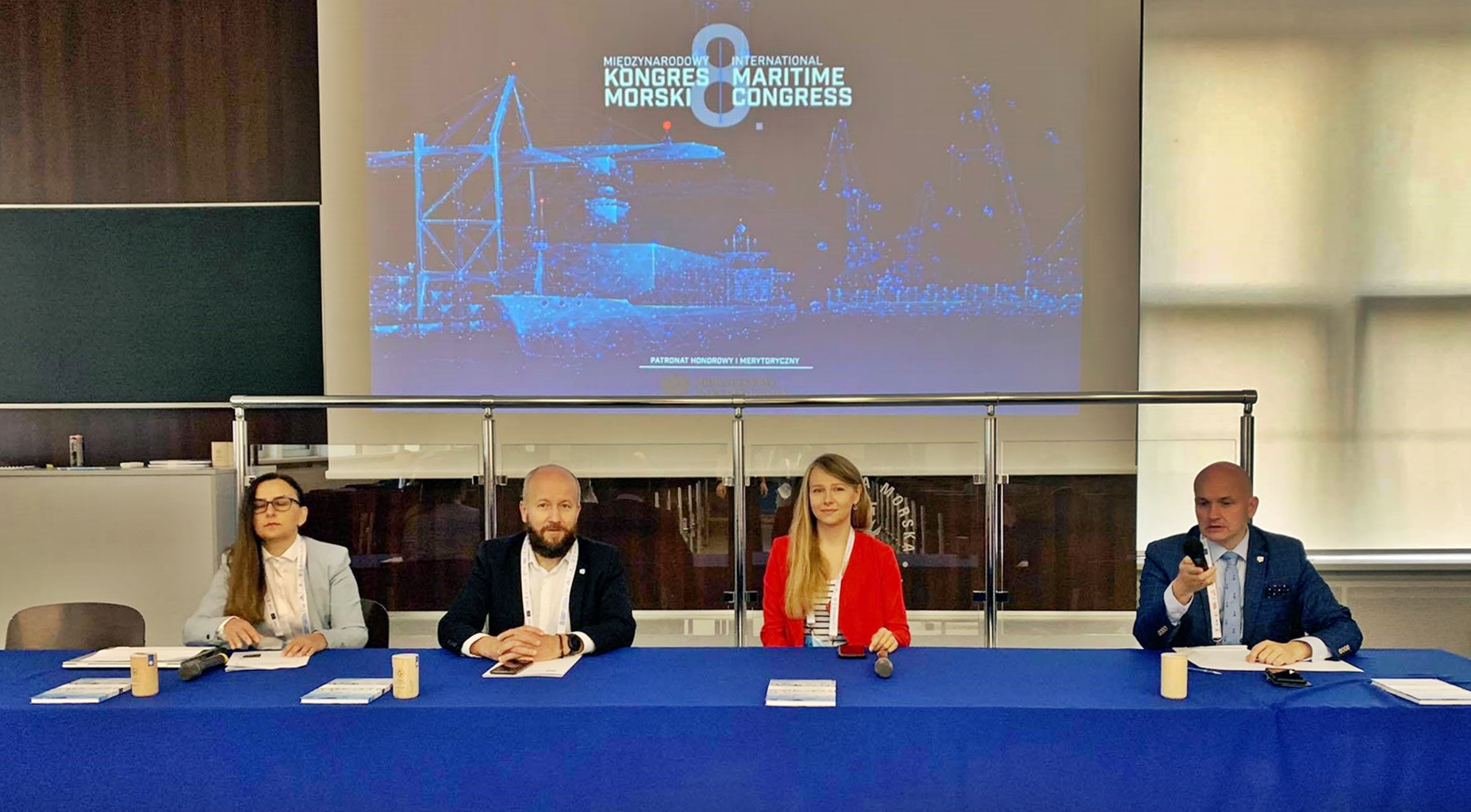




The 8th International Maritime Congress was a place of expert debate on water transport, innovative technologies, ecology and protection of marine ecosystems. The panel discussion presented the synergy effects of activities for the protection of the waters of the Baltic Sea thanks to the cooperation of government institutions in the project of updating the program of protection of sea waters.
The Synergy of actions for the protection of the waters of the Baltic Sea on the example of cooperation between government institutions opened a block of discussions and presentations on ecology. The speakers of the panel were: Małgorzata Bogucka-Szymalska – Deputy Director of the Water Management and Inland Navigation Department, Ministry of Infrastructure, Joanna Sasal, Deputy Director of the Water Environment Management Department at State Water Holding and Marek Duklanowski, Director of the Regional Water Management Board in Szczecin.
The marine waters protection program is a cross-sectoral document which has to reconcile interests from many areas. To this end, in order to ensure consistency with other studies and to use expert knowledge, the President of PGWWP appointed a monitoring team for the development of program updates. In addition to representatives from the ministries indicated in the Water Law Act, there are also experts from, among others, GDOŚ, CIEP or NMFRI. Activities in the program concerning such areas as agriculture, fisheries and wastewater management. The overriding goal of the program is to plan the most effective activities in order to minimize the pressure we exert on the Baltic Sea. On the one hand, we have an ecological aspect, and on the other, further restrictions that we must introduce, for example, for farmers or fishermen. The greatest difficulty is the fact that these are sectors that are already subject to high requirements, but still, for example, as in the case of eutrophication – too much pollution comes from agriculture and, secondly, from wastewater treatment plants. Hence the need to introduce measures to reduce nitrogen and phosphorus loads.

Director Bogucka-Szymalska opened the panel, presenting the assumptions for the implementation of the Marine Strategy Framework Directive, implemented by the Water Law Act, and the update of the sea water protection program developed by PGW Polish Waters. She also presented how the implementation of various EU directives influences the state of the Baltic Sea waters. She emphasized the importance of inter-ministerial arrangements and cooperation in this regard and discussed the effects of many years of work to improve the condition of Polish waters, including measures related to the organization and investments in the water and sewage sector, which, apart from agriculture, is the main source of nutrients reaching the Baltic Sea. She pointed out that the actions included in aPOWM also refer directly to the need to reduce the amount of nutrients in our sea.
In her presentation, Deputy Director Joanna Sasal drew attention to the cooperation of Polish Waters with other institutions in the development and implementation of the sea water protection program, presenting the number of corrective measures included in the program, the implementation of which is to lead to improvement, and ultimately to good condition of the Baltic Sea. She emphasized that nearly 80% of pollutants end up in the sea from land, they come from us – humans. Hence, it is important that we, both the inhabitants of coastal areas and those in the south, take care of, for example, what we do with our waste or what cosmetics we use. Any garbage thrown into the river will end up in the sea. The microplastics contained in the cosmetics are also not retained in sewage treatment plants, but together with the treated sewage they are discharged into waters or soils and then transported to the sea, posing a great threat not only to us, but also to the marine fauna and flora. She presented soft-educational activities accompanying the works on the aPOWM project, the aim of which is to draw attention to the problem of the degradation of the Baltic Sea and the responsibility of the entire society for its condition and actions for its protection.

Director Marek Duklanowski presented the cross-sectional activities carried out by the RZGW in Szczecin, the purpose of which is, on the one hand, to improve navigation conditions in the water region, on waterways, and on the other hand, to recreate the continuity of migration in the region’s river network, on the example of, inter alia, the implemented LIFE project, which is a significant support for the reconstruction of the migration routes of bi-environmental fish, whose life cycle is directly related to the Baltic Sea. The director emphasized the role of cooperation with other institutions, local governments and non-governmental organizations to improve the condition of the region’s waters and educate the public, emphasizing the cooperation in this field with the Provincial Fund for Environmental Protection and Water Management in Szczecin.
The Baltic Sea is an important part of the international economy, and the region’s economic development is as important as the protection of its marine ecosystem. Poland is carrying out a number of investments influencing the commercial and transport revival of Polish seaports, but also takes measures to achieve and maintain a good condition of the Baltic waters, which is reflected in the planning work – developing an update of the sea water protection program, which is developed by Polish Waters. Public consultations on the aPOWM project are ongoing until October 5, 2021. The reviewed update includes nearly 60 new actions for the Baltic Sea, the implementation of which will bring us closer to achieving the environmental goals set for marine waters. More information: https://chronmorze.eu/en/consultations.

From the left: Director Bogucka-Szymalska, Ministry of Infrastructure, Director Marek Duklanowski, RZGW Szczecin, Deputy Director Joanna Sasal, State Water Holding. Moderator – Sergiusz Kieruzel, Polish Waters. Photo RZGW Szczecin.
